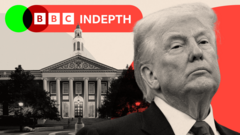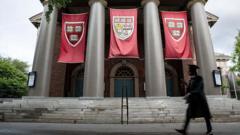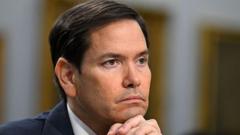The Trump administration's recent suspension of student visa interviews has left prospective Indian students in doubt about their opportunities in the U.S., leading many to reconsider their educational and career plans.
Uncertainty Surrounds Indian Students’ Aspirations Due to U.S. Visa Interview Halt

Uncertainty Surrounds Indian Students’ Aspirations Due to U.S. Visa Interview Halt
A pause in U.S. student visa interviews creates turmoil for Indian students, altering plans and inciting worries about future studies abroad.
In India, where a record number of students seek higher education in the United States, thousands are now caught in a frustrating limbo due to the current freeze on visa interviews by the Trump administration. This hiatus has raised significant concerns amongst prospective students about their futures as they navigate a period of ambiguity that might disrupt their longstanding educational aspirations.
With approximately 330,000 Indian students currently enrolled in American colleges and universities, the news has prompted many to take drastic measures to adapt. From deleting social media posts to establish a more discreet online profile to forming encrypted chat groups to share information, students are seeking every possible avenue to mitigate the associated risks of the visa application process.
Many have also turned to spiritual practices, visiting what are colloquially referred to as "visa temples," where Hindu devotees believe that prayers can help improve their chances of obtaining student visas. The lengthy wait has turned career advisors into therapists, as many students express their stress and uncertainty.
Kaushik Sharma, an aspirant yearning to secure a spot in a top U.S. policy program, illustrated the emotional toll with his statement about not wanting to live in fear while studying abroad. As a response, he is now considering other options in the U.K. and Singapore. Similarly, Karan Gupta, a career counselor swamped with inquiries, explains students are inquiring whether applying to American universities remains a viable choice with uncertainty reigning.
The feedback loop among families with ties to the U.S. has intensified, with online “war rooms” forming where relatives strategize on the best potential outcomes for their loved ones amid the shifting landscape of U.S. immigration policy. Existing students in the U.S. are also concerned about their visa status, raising the stakes on both ends of this educational journey.
As the U.S. administration continues to evaluate the situation, the impact of these visa policy changes may have deep-reaching implications on the educational decisions of aspiring students in India, compelling many to rethink their paths.
With approximately 330,000 Indian students currently enrolled in American colleges and universities, the news has prompted many to take drastic measures to adapt. From deleting social media posts to establish a more discreet online profile to forming encrypted chat groups to share information, students are seeking every possible avenue to mitigate the associated risks of the visa application process.
Many have also turned to spiritual practices, visiting what are colloquially referred to as "visa temples," where Hindu devotees believe that prayers can help improve their chances of obtaining student visas. The lengthy wait has turned career advisors into therapists, as many students express their stress and uncertainty.
Kaushik Sharma, an aspirant yearning to secure a spot in a top U.S. policy program, illustrated the emotional toll with his statement about not wanting to live in fear while studying abroad. As a response, he is now considering other options in the U.K. and Singapore. Similarly, Karan Gupta, a career counselor swamped with inquiries, explains students are inquiring whether applying to American universities remains a viable choice with uncertainty reigning.
The feedback loop among families with ties to the U.S. has intensified, with online “war rooms” forming where relatives strategize on the best potential outcomes for their loved ones amid the shifting landscape of U.S. immigration policy. Existing students in the U.S. are also concerned about their visa status, raising the stakes on both ends of this educational journey.
As the U.S. administration continues to evaluate the situation, the impact of these visa policy changes may have deep-reaching implications on the educational decisions of aspiring students in India, compelling many to rethink their paths.





















